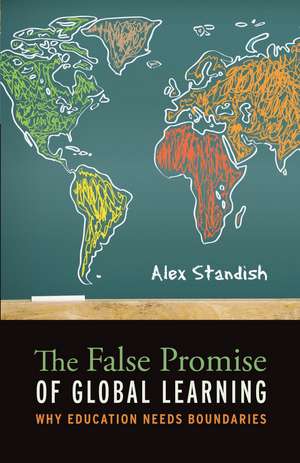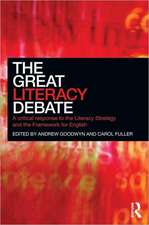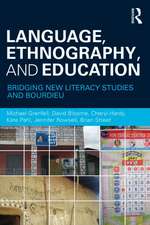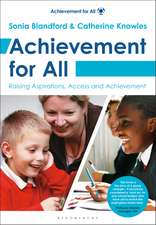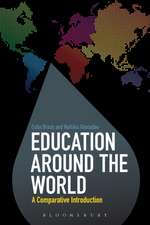The False Promise of Global Learning: Why Education Needs Boundaries
Autor Dr Alex Standishen Limba Engleză Paperback – aug 2012
| Toate formatele și edițiile | Preț | Express |
|---|---|---|
| Paperback (1) | 165.48 lei 6-8 săpt. | |
| Bloomsbury Publishing – aug 2012 | 165.48 lei 6-8 săpt. | |
| Hardback (1) | 567.75 lei 6-8 săpt. | |
| Bloomsbury Publishing – aug 2012 | 567.75 lei 6-8 săpt. |
Preț: 165.48 lei
Nou
Puncte Express: 248
Preț estimativ în valută:
31.67€ • 34.42$ • 26.62£
31.67€ • 34.42$ • 26.62£
Carte tipărită la comandă
Livrare economică 21 aprilie-05 mai
Preluare comenzi: 021 569.72.76
Specificații
ISBN-13: 9781441155917
ISBN-10: 1441155910
Pagini: 224
Ilustrații: illustrations
Dimensiuni: 138 x 216 x 15 mm
Greutate: 0.32 kg
Ediția:New.
Editura: Bloomsbury Publishing
Colecția Continuum
Locul publicării:New York, United States
ISBN-10: 1441155910
Pagini: 224
Ilustrații: illustrations
Dimensiuni: 138 x 216 x 15 mm
Greutate: 0.32 kg
Ediția:New.
Editura: Bloomsbury Publishing
Colecția Continuum
Locul publicării:New York, United States
Caracteristici
Demonstrates how current reforms are undermining the authority and effectiveness of teachers
Notă biografică
Alex Standish is a Senior Lecturer in Geography Education at IOE, UCL's Faculty of Education and Society, University College London, UK, and fellow of the Royal Geographical Society. As well as teaching PGCE, Teach First and Master's in Education students at UCL Institute of Education, he works in an advisory capacity for the Department for Education, the Mayor's Office, Department for International Trade, Cambridge Examinations, as well as several London schools with respect to curriculum and teacher education. Standish previously taught at Western Connecticut State University, USA. Together with Alka Sehgal Cuthbert, he co-edited What Should Schools Teach? Disciplines, Subjects and the Pursuit of Truth.
Cuprins
Introduction1. The Origins of International and Global Education2. Making Global Schools3. Global Knowledge4. Global Skills5. Global Ethics6. The Essential Boundaries for Educating about the WorldConclusionBibliographyIndex
Recenzii
Criticizing the 'global' word in education is not the done thing at all, especially in the 'decentered' modern academy. Yet globalism has long required an intellectual challenge grounded in empirical observation of contemporary schooling policy. Alex Standish has done it while retaining an awareness of the distinctions necessary to learn real knowledge. He has written that very rare thing, an educational book that is actually necessary.
"This book is timely and will repay careful reading. The main argument, that global initiatives in schools have undermined 'the very meaning and purposes of education' will be very provocative for some. Others will welcome the sustained case made for traditional subject-knowledge to be returned to the school curriculum. But all should avoid running for the barricades and instead engage with the arguments. For in the end this book, from a very clear standpoint, forces us to confront that key question: 'what does it mean to be educated in this day and age?'
Standish lays out a convincing case that presumably rudderless educational systems have substituted the traditions of teaching and learning so cherished in modern times and replaced them with dubious notions of economic competition and the acquisition of skills as the drivers of educational policies today. Moreover, Standish argues, rather than being a panacea for the changes brought about by technological advance, such shifts in focus are less about meeting the challenges of modernity and are, rather, little more than bromides for an exhausted and increasingly anxious age.
Alex Standish fundamentally questions our assumptions about global education and its promise to advance international understanding. His study indicates how the field of global education is driven by the goals of promoting particular values, rather by aspirations to expand knowledge of different societies. Indeed he observes that the rise of global education in the US and the UK school curriculum has helped legitimize declining knowledge of other countries and languages. Instead Standish suggests global education supports a particular model of global governance which has implications for democratic self-determination and development.
...the book is well documented and will likely serve as a catalyst for discourse among scholars and advanced graduate students seeking a diversity of perspectives on this timely, important topic. Summing Up: Recommended. Graduate and research collections.
"This book is timely and will repay careful reading. The main argument, that global initiatives in schools have undermined 'the very meaning and purposes of education' will be very provocative for some. Others will welcome the sustained case made for traditional subject-knowledge to be returned to the school curriculum. But all should avoid running for the barricades and instead engage with the arguments. For in the end this book, from a very clear standpoint, forces us to confront that key question: 'what does it mean to be educated in this day and age?'
Standish lays out a convincing case that presumably rudderless educational systems have substituted the traditions of teaching and learning so cherished in modern times and replaced them with dubious notions of economic competition and the acquisition of skills as the drivers of educational policies today. Moreover, Standish argues, rather than being a panacea for the changes brought about by technological advance, such shifts in focus are less about meeting the challenges of modernity and are, rather, little more than bromides for an exhausted and increasingly anxious age.
Alex Standish fundamentally questions our assumptions about global education and its promise to advance international understanding. His study indicates how the field of global education is driven by the goals of promoting particular values, rather by aspirations to expand knowledge of different societies. Indeed he observes that the rise of global education in the US and the UK school curriculum has helped legitimize declining knowledge of other countries and languages. Instead Standish suggests global education supports a particular model of global governance which has implications for democratic self-determination and development.
...the book is well documented and will likely serve as a catalyst for discourse among scholars and advanced graduate students seeking a diversity of perspectives on this timely, important topic. Summing Up: Recommended. Graduate and research collections.
Descriere
Provides an informed and impassioned critique of the movement for global education in schools.
